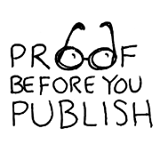May 27, 2014 | Tuesday Tips
These two words are often confused with one another. Recently, they have been misused often in my reading. So, it became the Tuesday Tip for today.
Compliment: an admiring or flattering remark, praise
Example: Do you blush when you are given a compliment?
Complement: goes well with others, completes
Example: The chocolate sauce complements the cheesecake.
A quick tip to determine if you should use an “i” or an “e”: I like to give compliments.
May 20, 2014 | Tuesday Tips
This Tuesday Tip is for a reader…you know who you are.
Lets: used when saying that something is “allowed”
Example: The man lets his roommate believe he knows something about computers.
Let’s: used when abbreviating the phrase “let us”
Example: Let’s try to find something nice to say about our roommate.
May 14, 2014 | Tuesday Tips
Here is an example of a mistake I’ve found recently in a few different books. Hopefully this will clear up any confusion.
Led means guided. It is the past tense of to lead.
Lead is a type of metal. It rhymes with red.
I’ve found the word lead used many times when the author meant led. Not only is the wrong word being used, but it makes the reader pause to determine if the sentence is in the past or present tense.
May 6, 2014 | Tuesday Tips
This Tuesday Tip is based on an error I found in a book I finished reading today.
Sink: where you wash dirty clothes (or dishes, or hands), to submerge, to descend to a lower level
Sync or Synch: To match up, to coincide, to synchronize
Apr 29, 2014 | Tuesday Tips
These homophones have very different meanings and uses.
Right means correct, or opposite of left. It can be a noun, adjective, verb or adverb.
Example: Turn right at the next corner.
The noun rite is a ritual, formal ceremony or religious practice.
Example: Graduation is a rite of passage
Write is a verb meaning to compose or form letters or words.
Example: I am going to write a letter.
Apr 23, 2014 | Tuesday Tips
Everyday (one word) is an adjective meaning ordinary.
Example: These are my everyday clothes.
Every day (two words) uses the adjective every to modify the noun day.
Example: I wear clothes every day.
Here’s a quick tip to help: If you’re not sure which to use, replace everyday/every day with each day. If the sentence still makes sense with each day in its place, then you want to use the two-word (every day) form.

